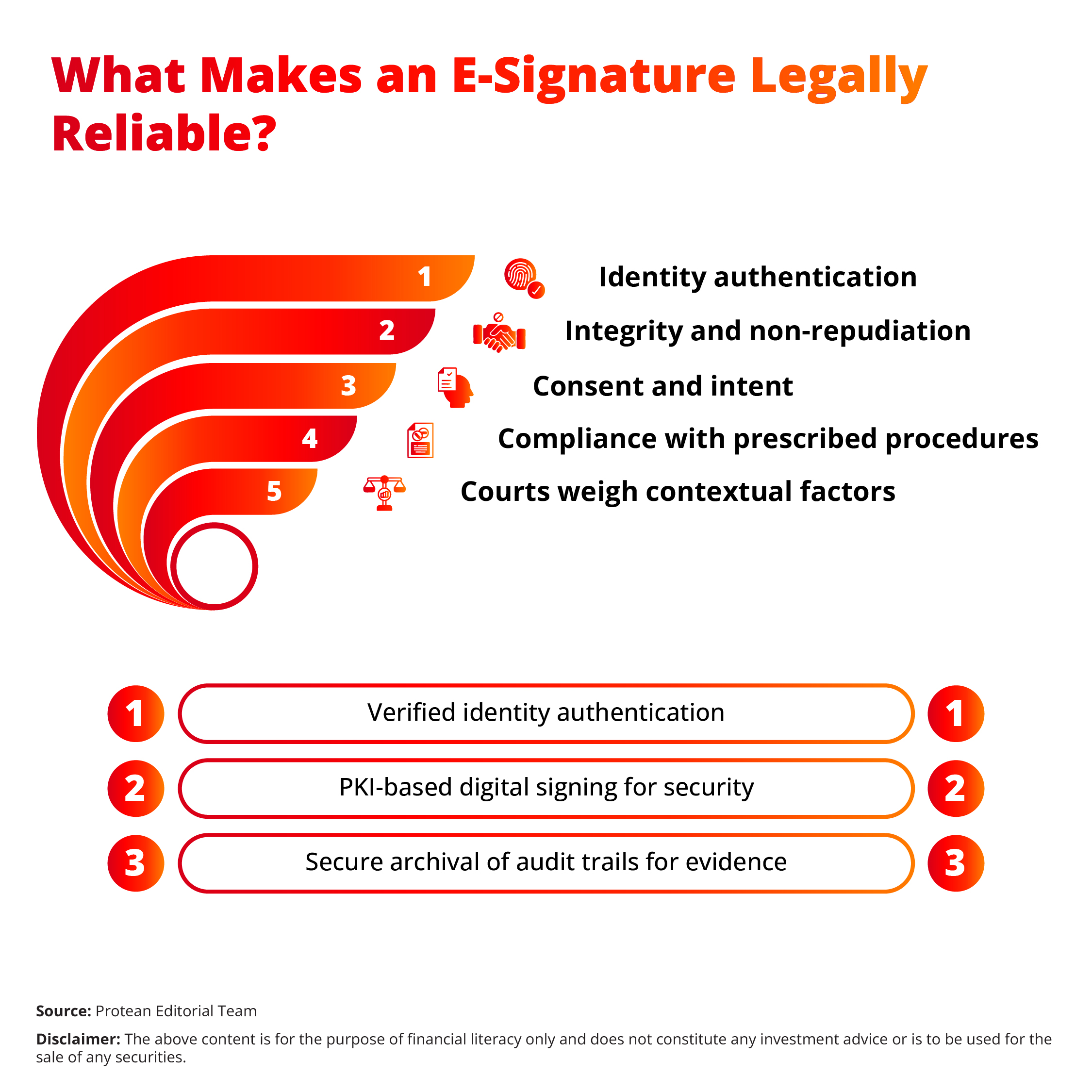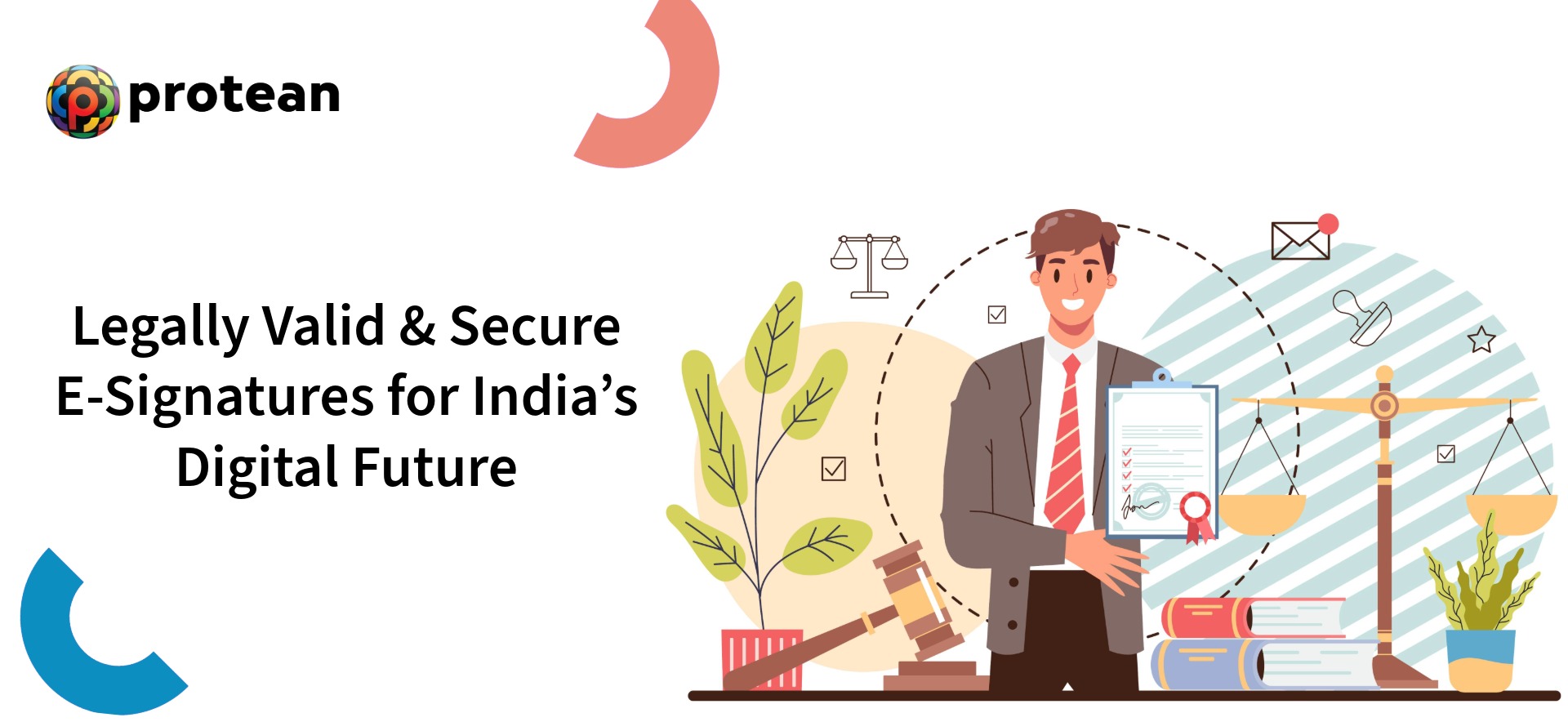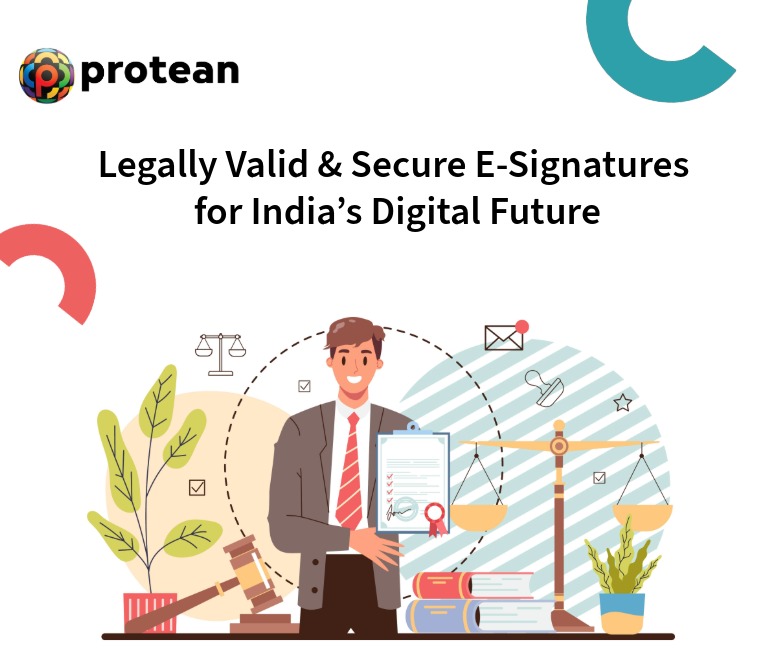So, is an electronic signature or e signature legally recognised in India? Let us answer questions like these on digital signatures and learn more on e signature India significance.
An electronic signature is an important part of India’s digital transformation, enabling contracts, regulatory filings, and financial onboarding to be completed without the burden of physical paperwork.
The Information Technology Act, 2000, along with subsequent rules, establishes the legal basis for electronic consent. Building on this, India’s Aadhaar-enabled eSign framework and licensed Certifying Authorities have driven large-scale adoption across banking, capital markets, and government services.
Here’s more on the credibility of an electronic signature in India.
Legal Framework: Is Electronic Signature Enough
India legally has recognised electronic records and electronic signatures under the Information Technology Act, 2000 and related rules framed by the Ministry of Electronics & Information Technology.
eSign is an online electronic signature service that generates digitally verifiable signatures after authenticating the signatory.
Further, the legal framework of eSign is described as follows:
- Regulatory Oversight: The Controller of Certifying Authorities (CCA) issues guidance and sets interoperability standards for electronic signature services.
- Aadhaar Authentication: UIDAI’s Aadhaar authentication system is widely used as the e-authentication method for eSign, operating through empanelled Certifying Authorities (CAs) and Application Service Providers (ASPs).
- Legal Validity: The statutory framework accords properly executed electronic signatures the same evidentiary value as handwritten signatures, provided they comply with prescribed modes and procedures.
E Signature vs. Digital Signature: Understanding the Difference
The terms “e signature” and “digital signature” are often used interchangeably in everyday speech. However, they refer to distinct technical and legal constructs.
An electronic signature (e signature) is a broad term describing any electronic method that indicates acceptance of an agreement or record.
Examples include:
- Scanned signatures
- Typed names on a form
- OTP-verified clicks
- Aadhaar-based eSign workflows
On the other side, a digital signature, commonly denotes a cryptographic mechanism that uses Public Key Infrastructure (PKI) to create a mathematically verifiable seal on a document. It proves integrity (the document wasn’t changed) and authorship (the signature was created by the private key holder).
In India, Aadhaar eSign can offer a practical balance of convenience and legal security.
Step-by-Step Flow of How Aadhaar eSign Works
- Identity Verification → The signer authenticates using Aadhaar OTP or biometric.
- Certificate Issuance → An authorised Certifying Authority issues a digital signature certificate.
- Signature Attachment → A secure cryptographic signature is applied to the document.
- Secure and Fast → The process combines the speed of e-authentication with the security of PKI-based digital signatures.
- Wide Adoption → Banks, fintechs, and government portals rely on Aadhaar eSign for seamless onboarding and contract execution.
- Legal Weight → Courts give greater validity to e-signatures backed by strong identity checks and tamper-proof technology.

What Makes an E Signature Legally Reliable
Several factors that determine legal reliability of an electronic signature are as follows:
- Identity authentication: If the signatory’s identity is established through a trusted source, for instance, Aadhaar authentication or an issued digital certificate by a CCA-licensed provider, the signature’s probative value increases.
- Integrity and non-repudiation: Use of cryptographic techniques (digital signatures) produces an audit trail and tamper-evidence so the document cannot be altered without detection.
- Consent and intent: There must be clear evidence that the signer intended to accept the terms, a recorded OTP confirmation, biometric consent or an explicit checkbox with time-stamp strengthens the inference of intent.
- Compliance with prescribed procedures: Employing recognised Service Providers, maintaining logs and preserving metadata in accordance with CCA/UIDAI rules helps satisfy statutory requirements.
- Courts weigh contextual factors: Courts consider factors such as industry practices, security measures in place, and whether either party raised timely objections when evaluating the enforceability of an e-signature. Legal experts and digital trust providers suggest adopting layered controls for stronger validity, including:
- Verified identity authentication
- PKI-based digital signing for security
- Secure archival of audit trails for evidence
Documents You Can (and Cannot) Sign Electronically
Following are permitted for e-signing:
- Most commercial contracts
- Account-opening forms
- Service agreements
- Loan documents
- Government filings (subject to statutory standards and party consent)
Sectors such as mutual funds, banking and securities use Aadhaar eSign or PKI-based digital signing extensively for instant onboarding. However, following still require physical signature:
- Negotiable instruments that need statutory endorsement
- Documents that legally require attestation before a public official
Users can check sector specific regulatory rules (MCA, RBI, SEBI) for such exceptions.
Conclusion
Electronic signatures are legally recognised and operationally mature in India. For businesses and financial professionals the practical takeaway is clear: adopt certified e-sign solutions, document consent flows, and preserve signed records and metadata. Where statutory exceptions apply, follow the specific regulator’s guidance. Done correctly, e signature India can reduce friction, cost and turnaround time while maintaining legal defensibility.
Providers like Protean eGov Technologies offer secure, Aadhaar-based eSign services and Digital Signature Certificates tailored to India’s digital ecosystem.
Frequently asked Questions
Is an OTP-based e signature valid in India?
Yes, if the OTP is tied to a verified identity (for example, Aadhaar OTP) and the process preserves audit logs and consent, it can be legally valid.
Does Protean provide eSign services in India?
Yes. Protean eGov Technologies is a licensed Certifying Authority and offers eSign services and end-to-end document-signing workflows integrated with Aadhaar-based authentication.
Can I e-sign a will or power of attorney?
Some personal legal instruments, like wills and certain powers of attorney may have statutory formalities (witnessing, notarisation) that complicate pure electronic execution. Indian law currently does NOT recognise electronic wills (e-Wills); a will must be physically signed in the presence of witnesses as per the Indian Succession Act and Indian Evidence Act. Powers of attorney also generally require physical execution or notarisation. Electronic signatures are excluded from the scope of Wills under the IT Act.

